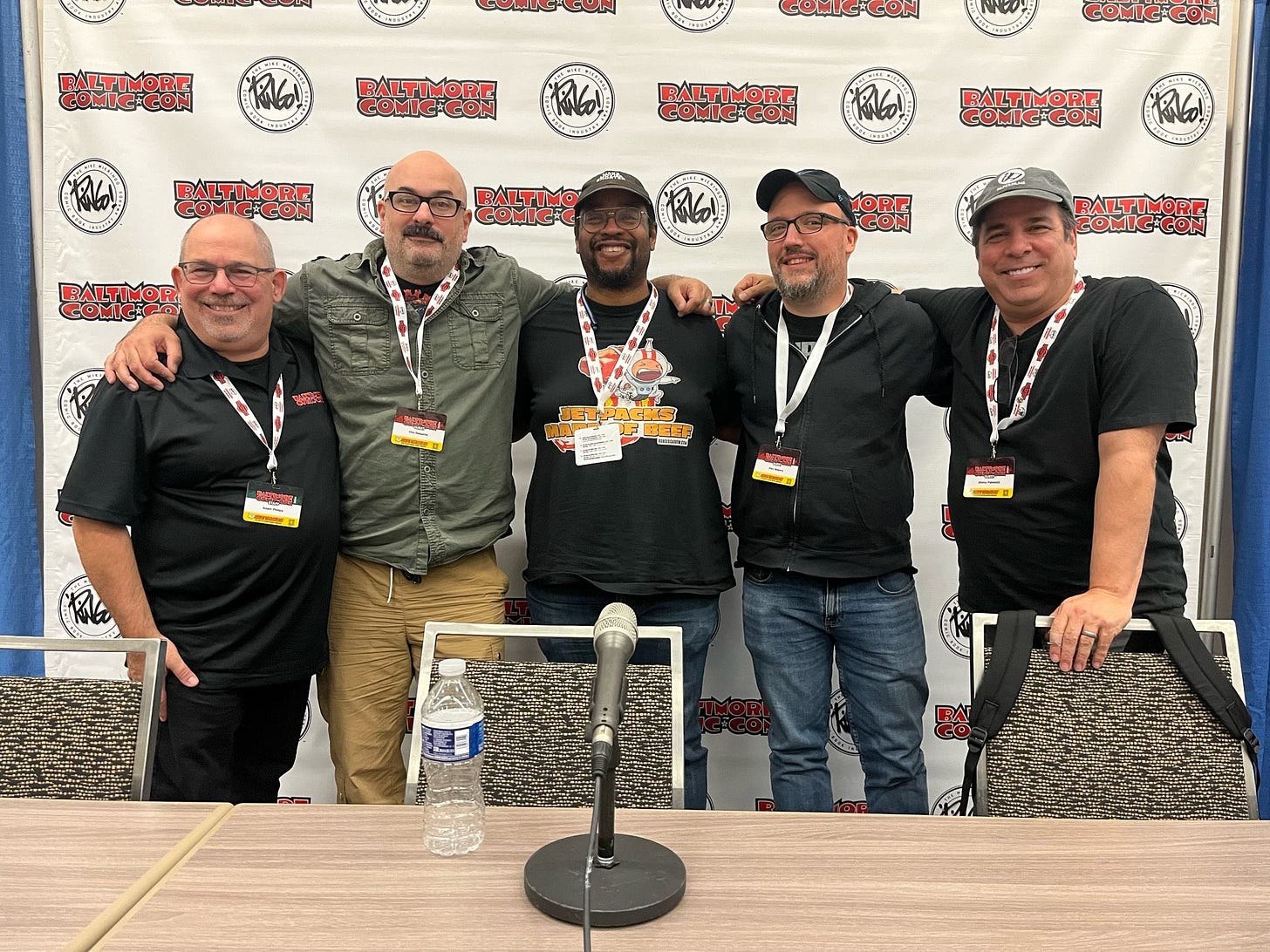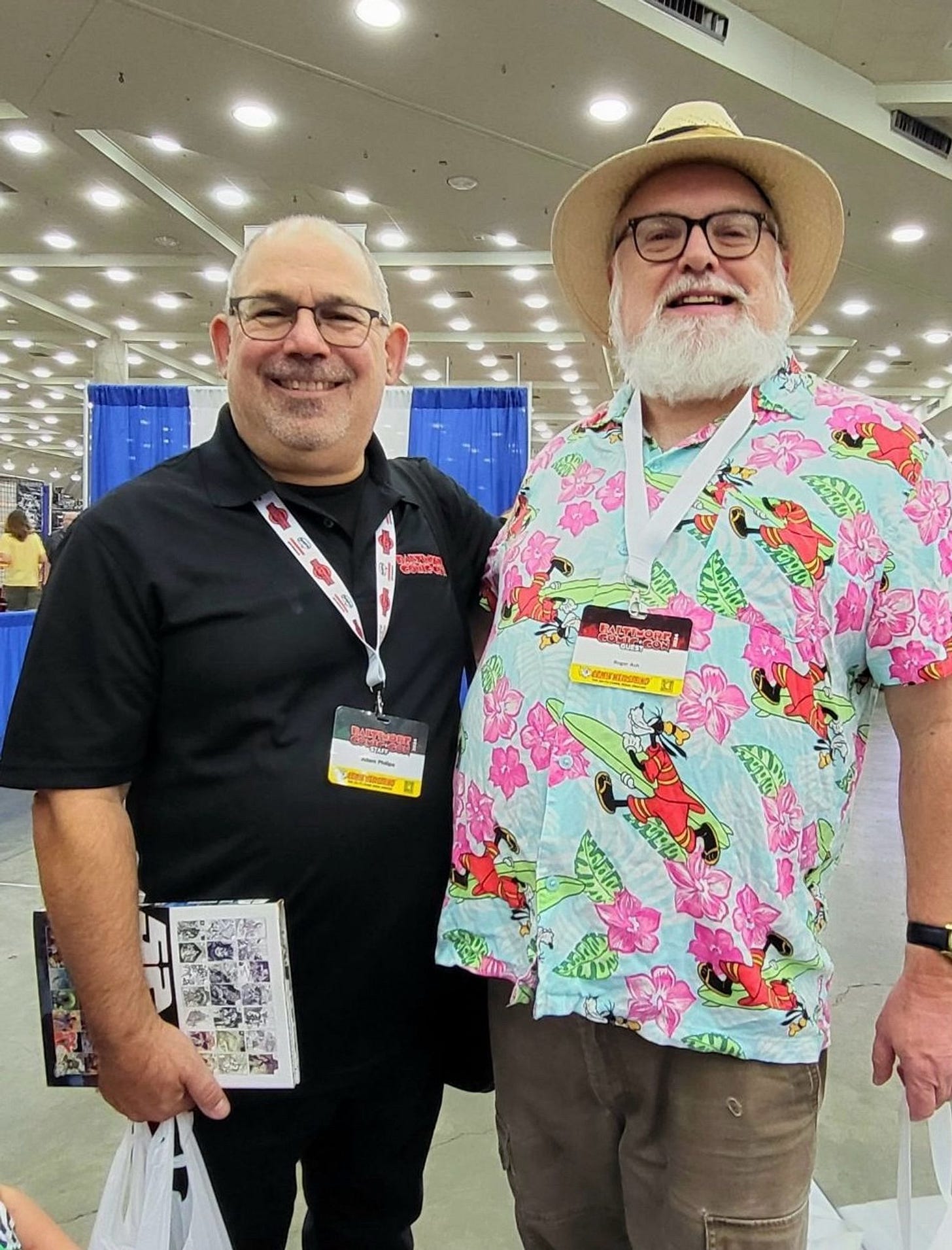Last week I attended Baltimore Comic-Con for the first time in something like 12 years, and while the show seemed more crowded and exciting than I remembered, it was still the same con it always has been: comics-forward, star-studded, and most of all fun.
I was there for more than just fun, though. A few weeks back, my old pal Marc Nathan, owner of Cards, Comics & Collectibles in nearby Reisterstown, MD, called and asked if I’d be interested in running programming for the show, saying his regular person wasn’t available this year. “We’ll feed you,” he said. “And you’ll be able to make some new contacts while you’re here.”
How could I say no? Marc, organizer of the show, and his fabulous wife, Shelly, are terrific people, and I had worked a little with some of the convention staff before, so I had no trepidations there. And, after years at DC Comics of conceiving, planning, building, and delivering panels at shows like San Diego, I decided this was not that big a leap.
Looking at last year’s schedule, I put together a slate of about 60 panels, with input and ideas from lots of folks, including old pals Bob Greenberger and Bob Harrison, and new pals like Todd Dezago and Emily Whitten.
On arrival, I jumped into action, joining the team to help assemble the gift bags for the Ringo Awards into the evening of Wednesday, September 18. The next day I walked the convention center, meeting up with the super-helpful AV crew who I’d see over and over for the duration of the show itself.
Thursday night I joined a group led by Bob Harrison and his lovely wife, Shari, for dinner at the Guinness Open Gate Brewery, with friends including Tom Raney, Jim Starlin, Paul Storrie, Thom Zahler, and Gus Vasquez.
And then it was Friday. The show opened at 1pm, and panels started at 2. I spent a lot of my time wandering up and down the hall where the panel rooms were located. With panels beginning every hour, there was hardly time to go anywhere else, and I had my hands full getting my volunteers to check on talent to make sure they knew what time their panels were, where they had to go, and whether they needed someone to watch their tables while they were away.
We also had last minute changes and updates to make. Just a few days before the show the comics community got the terrible news that John Cassaday had died. John was a friend of the show, so we wanted to do something special in his honor, and I was able to quickly put together a panel of his friends to talk about his life and career.
Everything ran very smoothly on site, thankfully. This was due to my planning as well as all the help I got from volunteers. I would have liked to watch more of the panels, but mostly I only had time to stick my nose in the rooms, make sure everything was running, and move on to the next room. Fortunately for me, the hallway was full of people making their way to their panels, so I got a chance to see folks like Howard Chaykin, Walter and Louise Simonson, Heidi MacDonald, Sanford Greene, Shawn Martinbrough, and many others.
I did get to moderate two panels: One was a discussion of Jack Kirby with panelists Walter Simonson, Karl Kesel, and Mark Buckingham that was a lot of fun. I looked at it as an opportunity to talk about what made Jack Kirby such a vibrant, innovative comics creator, and the panelists had a lot to say on the subject.
The other panel was a new edition of “Untold Stories of Comics Creators,” a panel I first ran at San Diego this summer. This version had Vito Delsante, Jamal Igle, Alex Segura, and Jimmy Palmiotti telling stories and trying to score points off each other, game show style.
Another highlight of the weekend: Artist Chris Eliopoulos suggested a great panel that I was thrilled to be part of. He and writer Brad Meltzer have a very popular line of kid’s books that has been adapted into the hit PBS Kids animated TV series “Xavier Riddle and the Secret Museum,” which is about to start its second season. Chris offered to us the opportunity to debut the episode about Superman’s creators, Jerry Siegel and Joe Shuster. I was surprised to learn that Brad and Chris take as their starting point the kinds of challenges kids face, then find the right person or people to show how they might overcome those challenges.
On Sunday, the final bunch of panels began at 1pm, which meant that once they were off and running, I was able to head downstairs and catch up with friends like J.G. Jones, Cliff Chiang, Franco, Roger Ash, Steve Conley, and lots more.
After staff dinner that night at the Hard Rock Café, I had to fly out Monday at about 6am. Since getting home I’ve been writing down notes about things I’d do differently if I were to go back again, as well as ideas for panels and themes.
Thanks for showing me a great time, Baltimore Comic-Con!







Great to see you!